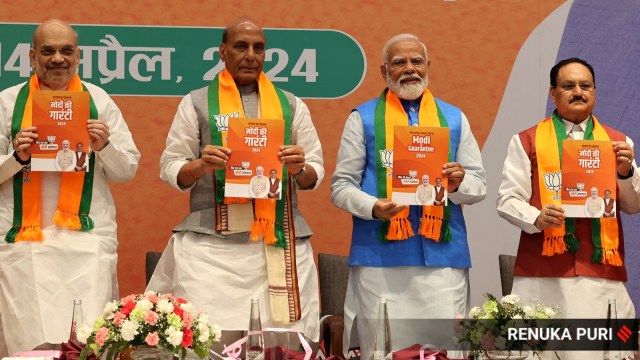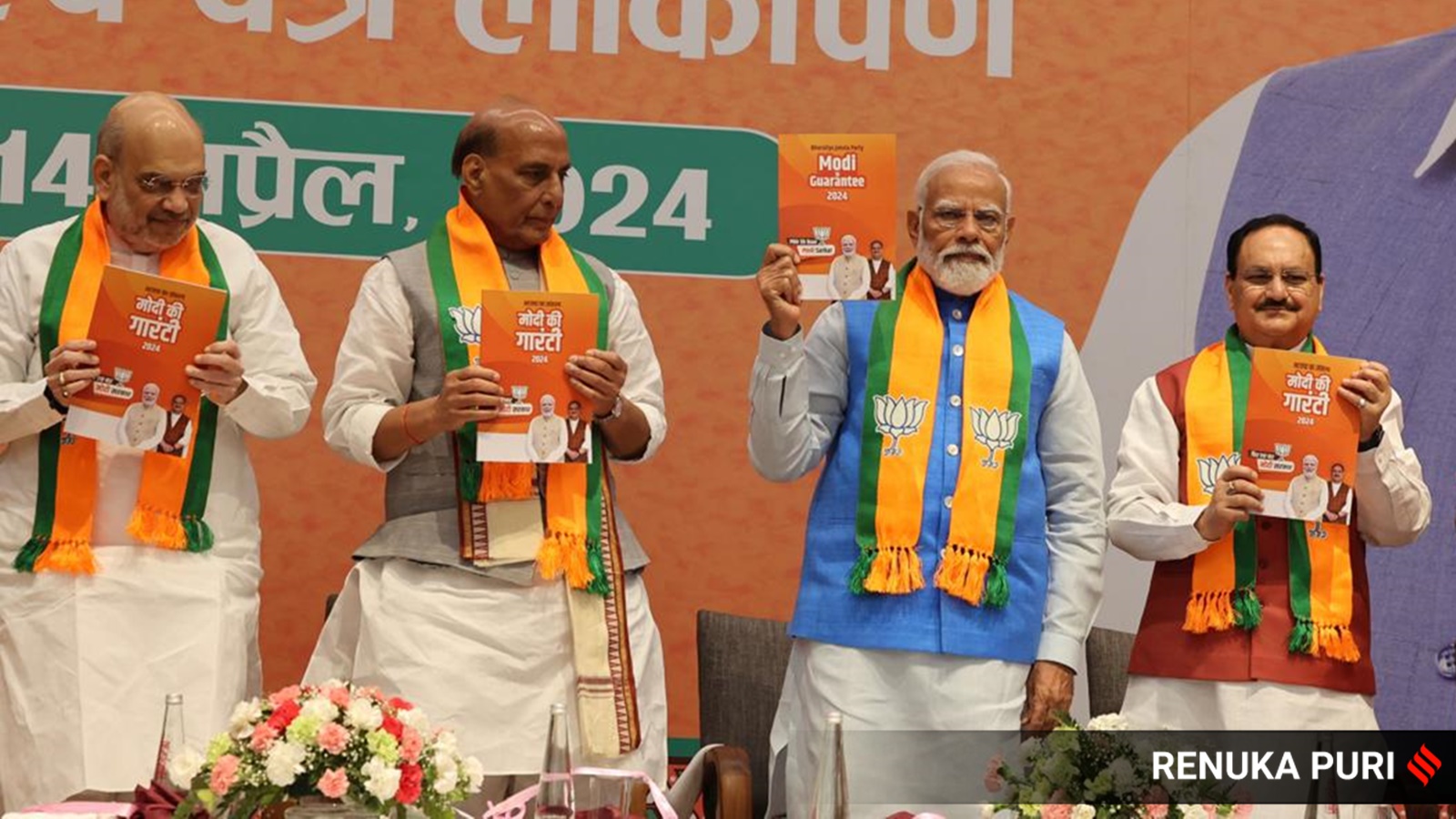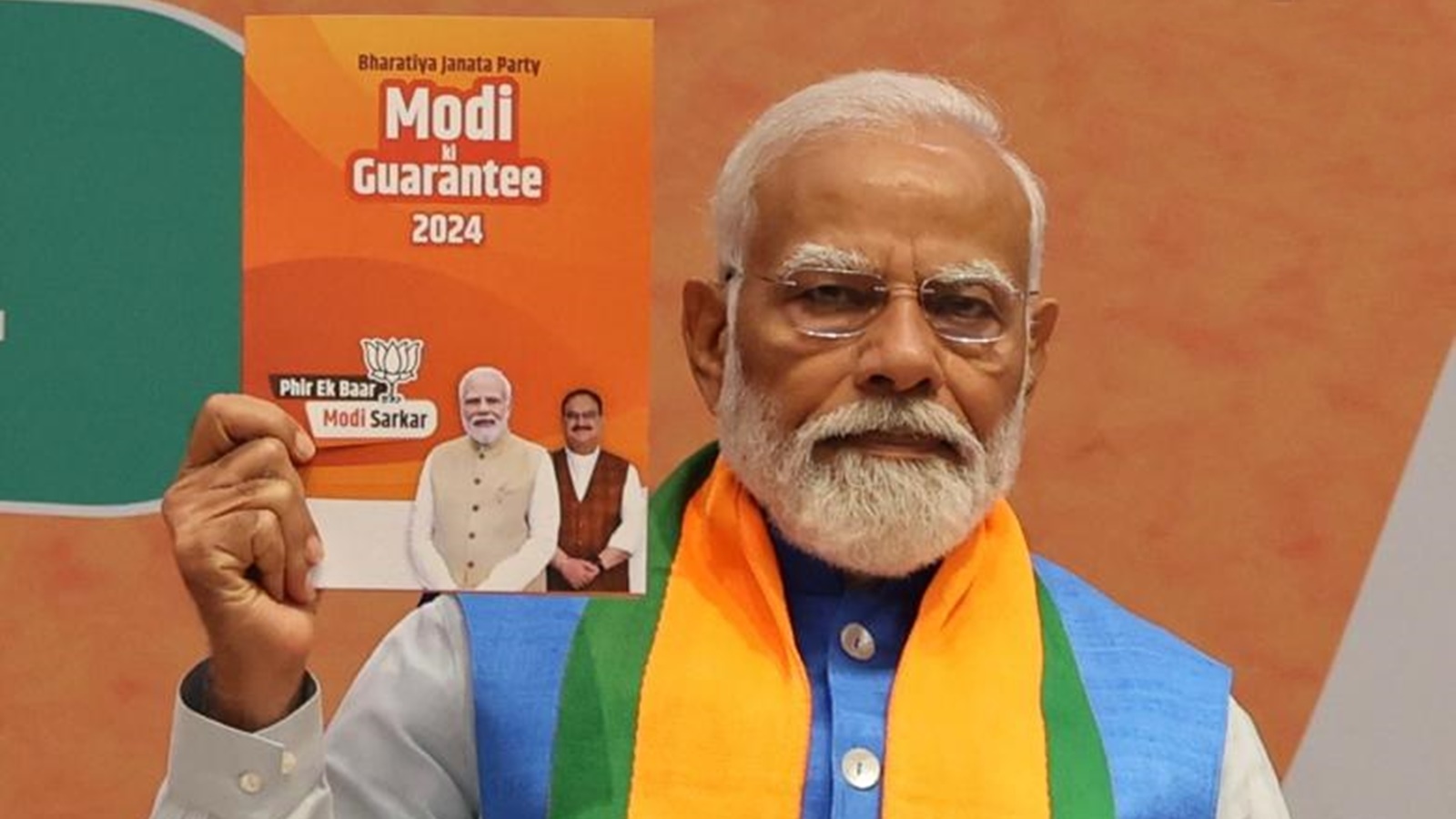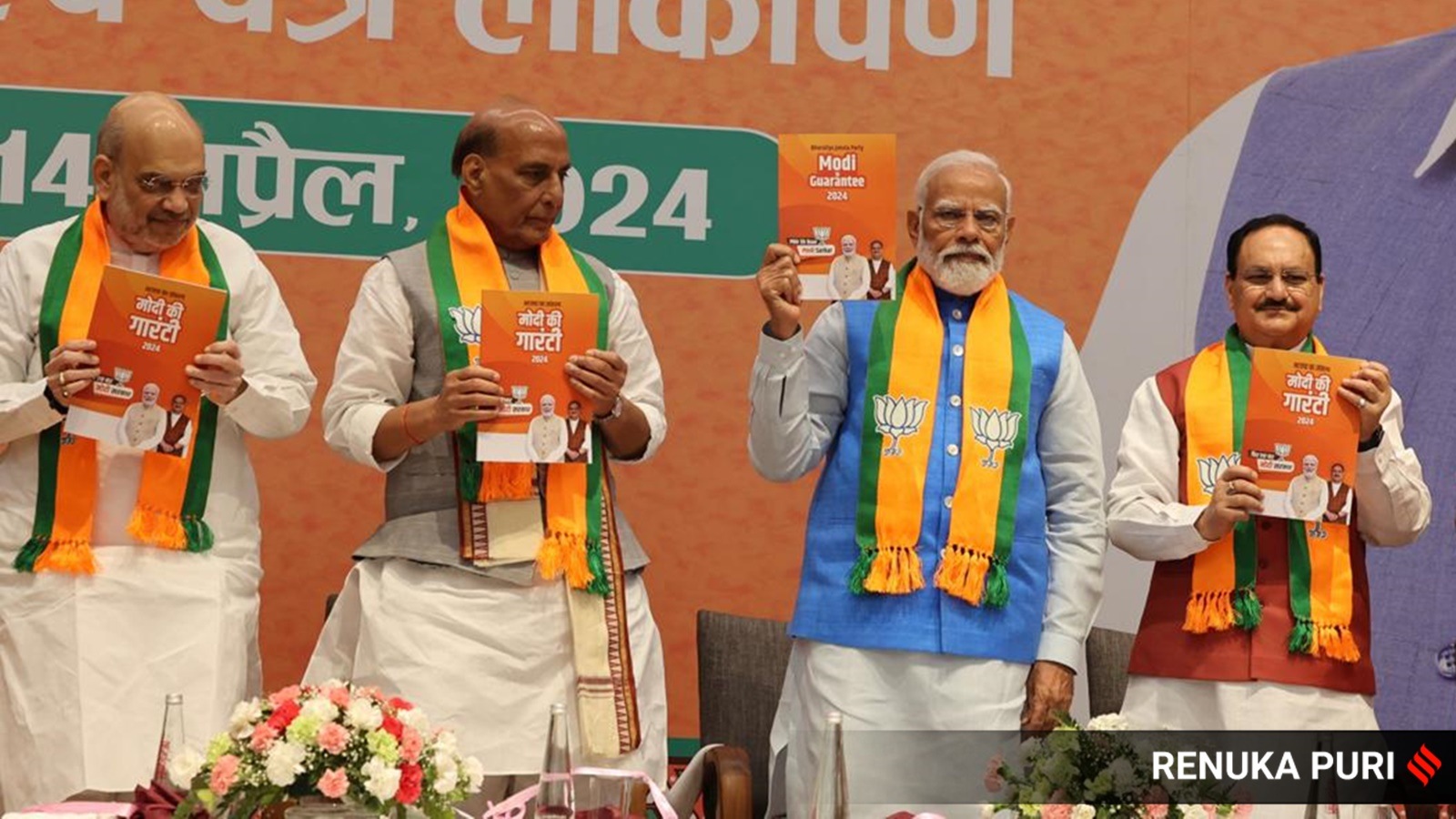“Today there is a cloud of uncertainty and tension looming over the world. There are conflicts everywhere. In such an hour of crisis, the safety of Indians living abroad is our priority. In times of global unrest, the necessity for a strong, stable government with an unequivocal majority in India becomes even more pronounced,” the Prime Minister said while releasing the BJP Sankalp Patra at the party headquarters here.

“The BJP remains dedicated to forming a government that will fortify the nation’s economy and propel it towards progress and development. This Sankalp Patra from the BJP assures such a government,” he said.
Story continues below this ad
In his preface to the manifesto, the Prime Minister said that the next five years will see a “final and decisive assault against poverty,” opening up of “newer avenues of growth in various sectors,” an intensified battle against corruption and unveiling “the next generation of reforms”.
 Prime Minister Narendra Modi, Union Home Minister Amit Shah, Defence Minister Rajnath Singh and BJP president J P Nadda unveil BJP’s manifesto on Sunday. (Express Photo)
Prime Minister Narendra Modi, Union Home Minister Amit Shah, Defence Minister Rajnath Singh and BJP president J P Nadda unveil BJP’s manifesto on Sunday. (Express Photo)
Amid highlighting of unemployment and rural distress by opposition parties in their campaigning, the BJP manifesto – projected as ‘Modi ki Guarantee’ – promises to create jobs in multiple sectors and expand welfare programmes if the party returns to power for a third consecutive term.
“India’s youth will not have even imagined the number of opportunities that will come their way,” the Prime Minister said.
Defence Minister Rajnath Singh, who also chaired the manifesto committee, Union Home Minister Amit Shah, Union Finance Minister Nirmala Sitharaman and BJP national president J P Nadda were present at the release of the manifesto.
Story continues below this ad
“We steadfastly adhere to the mantra of Reform, Perform, and Transform,” the Prime Minister said.
Asserting that the manifesto focuses on four pillars of Viksit Bharat – women power, youth power, poor and the farmers, Modi said: “This Sankalp Patra prioritises both quantity and quality of opportunities, aiming to create jobs through infrastructure development while also promoting start-ups and global centres for high-value services.”
 Prime Minister Narendra Modi releasing the BJP’s manifesto for the upcoming Lok Sabha elections. (Express photo by Renuka Puri)
Prime Minister Narendra Modi releasing the BJP’s manifesto for the upcoming Lok Sabha elections. (Express photo by Renuka Puri)
Having already fulfilled some of its key promises, such as construction of Ram Temple in Ayodhya and abrogation of Article 370, the BJP underlined its commitment to bring in a Uniform Civil Code (UCC) – a long-pending feature in its ideological agenda.
Although the party promised a “global outreach programme for documenting and promoting the tangible and intangible legacy of Lord Ram in all countries”, it indicated that there may not an extensive and massive movement in the lines of Ram Janambhoomi movement to construct temples in Kashi and Mathura, associated with Lord Shiva and Lord Krishna respectively, as demanded by hardliners.
Story continues below this ad
Instead, the Sankalp Patra under the subheading of guarantees for ‘Virasat bhi Vikas bhi‘ said: “We will undertake significant new projects to develop religious and tourist sites inspired by the Kashi Vishwanath corridor model, across the length and breadth of our country.”
With the BJP’s campaign revolving around welfare programmes initiated by the Modi government, the manifesto promised to expand such schemes. It promised to expand Ayushman Bharat – the Centre’s marquee health insurance scheme – to include all people aged above 70 years. It also assured piped cooking gas connections to all houses, a follow-up on a subsidised cooking gas cylinder programme launched in 2016. The manifesto also said that the new government would raise the cap on loans for non-farming small and micro borrowers to Rs 20 lakh; offer free housing for another 3 crore poor; and keep the free foodgrain programme for 80 crore people for five more years.
The manifesto also gave assurances on creating jobs in sectors such as infrastructure, aviation, railways, electric vehicles, green energy, semiconductors and pharmaceuticals, among others.
Modi said developing India as a food processing hub, green hub, global nutrition hub, solar energy hub as well as creation of Global Capability Centers, Global Technology Centers, and Global Engineering Centers would create new jobs for the youth.
Story continues below this ad
He said while the previous governments saw urbanisation as a challenge, the BJP perceives it as an opportunity. “We are committed to establishing new satellite towns across the country, poised to emerge as vital hubs for national development and job creation,” he said.
While the Citizenship Amendment Act (CAA) for which the rules were framed last month finds mention among the government’s achievements, the 69-page Sankalp Patra is silent on the National Register of Citizens (NRC).
 PM Narendra Modi with Union ministers Rajnath Singh, Amit Shah, and BJP chief J P Nadda at the party manifesto release in New Delhi on Sunday. (Express photo by Renuka Puri)
PM Narendra Modi with Union ministers Rajnath Singh, Amit Shah, and BJP chief J P Nadda at the party manifesto release in New Delhi on Sunday. (Express photo by Renuka Puri)
Although there were demands from a section of party leaders on the need to have a balanced population, the Sankalp Patra remained silent on a population policy.
Incidentally, while the Prime Minister refrained from specifically mentioning any particular state or cultural personality, the party promised to establish Thiruvalluvar Cultural Centres across the world if elected to power.
Story continues below this ad
The promise comes in the backdrop of the BJP trying to gain a foothold in Tamil Nadu. Thiruvalluvar, commonly known as Valluvar, was an ancient Tamil philosopher.
“The world’s oldest Tamil language is our pride. The BJP will undertake every effort to enhance the global reputation of the Tamil language,” said Modi, who has visited Tamil Nadu at least seven times in the past two months.
The party also promised a Global Space Academy under the aegis of ISRO and IIST with fellowship programmes for national and international students. “We will also establish a space forum that positions Bharat as a leading space power and assist Global South countries in using space and space-tech services,” the manifesto said.
The BJP said it received more than 1.5 million suggestions for its manifesto, including more than 400,000 through the NaMo app and over 1.1 million through videos.



 Prime Minister Narendra Modi, Union Home Minister Amit Shah, Defence Minister Rajnath Singh and BJP president J P Nadda unveil BJP’s manifesto on Sunday. (Express Photo)
Prime Minister Narendra Modi, Union Home Minister Amit Shah, Defence Minister Rajnath Singh and BJP president J P Nadda unveil BJP’s manifesto on Sunday. (Express Photo) Prime Minister
Prime Minister  PM Narendra Modi with Union ministers Rajnath Singh, Amit Shah, and BJP chief J P Nadda at the party manifesto release in New
PM Narendra Modi with Union ministers Rajnath Singh, Amit Shah, and BJP chief J P Nadda at the party manifesto release in New 





























